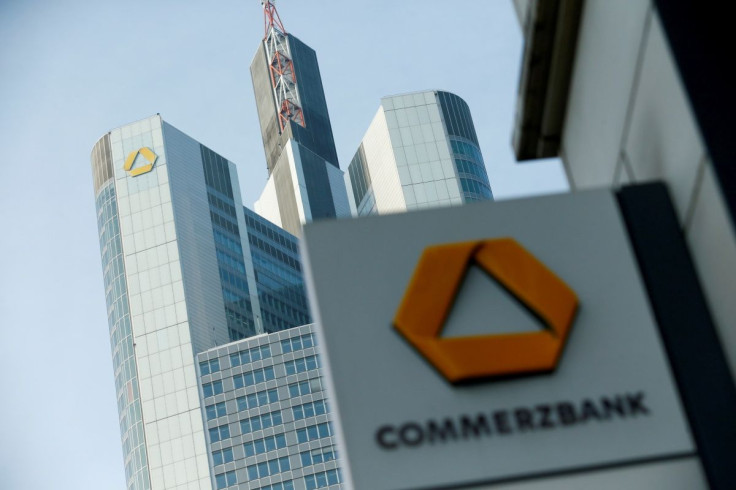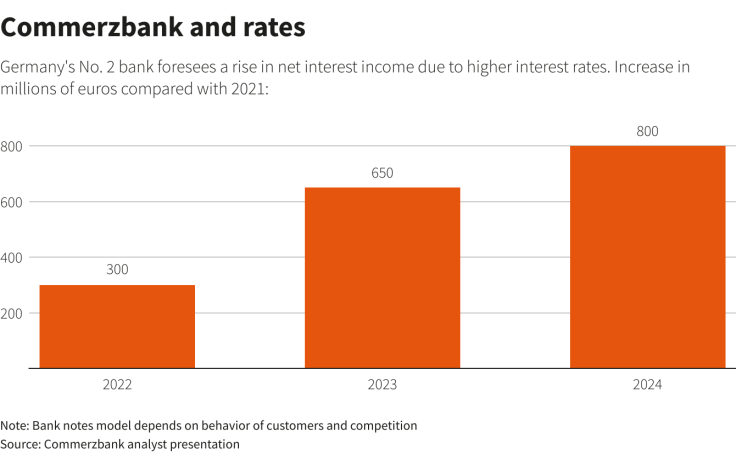Higher Interest Rates A 'Bright Spot' For Europe's Banks

European banks are hoping the boost to their businesses from higher interest rates will be long-lasting as they navigate the economic fallout of war, soaring inflation, and a looming energy crisis.
The German lender Commerzbank on Wednesday reported a bigger-than-expected second-quarter net profit that it said was especially helped by higher interest rates.
Exhibiting a trend seen across Europe, Commerzbank's net interest income jumped 26% in the period from a year earlier as longer-term interest rates rose in Germany and as the central bank in Poland, where it has a big presence, hiked official borrowing costs.
Manfred Knof, the bank's chief executive, described "considerable" risks on the horizon, but singled out interest rates as a "bright spot".
For years, bank executives on the continent have bemoaned the European Central Bank's ultra-low monetary policy and charging of fees to park their cash as a drag on their bottom lines.
But now, central bank efforts to arrest runaway inflation rates across Europe are proving a change of fortune. Banks from Spain to Britain are only just starting to benefit from the increased gap between what they charge borrowers and what they pay savers.
"Higher interest rates will strongly benefit all European banks' net interest margins and overall profitability, but the effect will be gradual and will vary between countries," Moody's said in a recent report.
Moody's pointed to banks in Spain, Italy and Portugal as among those that will in particular profit from higher rates because more bank loans there are variable rate, giving lenders a "more pronounced increase in bank revenues".
The higher income is bolstering executives' confidence about revenue, even as European officials cut growth forecasts amid soaring inflation and business activity contracts.
In Spain, Bankinter raised its guidance for net interest income from a low single-digit to a mid-to-high single-digit percentage growth for 2022, and Banco Sabadell made a similar upgrade.
Big British lenders including HSBC, Lloyds Banking Group and NatWest raised their forecasts for 2022 when reporting first half earnings over the last week, citing rising interest rates which are boosting lending margins.
Higher rates drove profits at Italy's top two banks Intesa Sanpaolo and UniCredit above market expectations in the second quarter.
Even banks in Germany, where stiff competition has depressed profits for the industry for years, are set to benefit with 11 billion euros in increased revenues in 2023 as a result of higher interest rates, according to a recent study by PricewaterhouseCoopers.
That's a significant figure, representing more than five times last year's annual profit of Deutsche Bank, the country's largest lender.
Commerzbank and rates:

Commerzbank reckons on earning at least 300 million euros more in additional interest income this year compared with 2021, rising to 800 million more in 2024. That compares with analyst expectations of total revenues of 9 billion for this year.
But the ultimate benefit is still unclear.
"We don't yet know how customers will react after many years of ultra-low rates," Commerzbank Chief Financial Officer told journalists.
In the case of Commerzbank, as with other banks, the tailwind will only partly counteract hits from potential writedowns for corporate loans that turn sour if energy sources dry up.
The bank sees provisions and writedowns of 700 million euros this year, up from 570 million last year.
© Copyright Thomson Reuters 2024. All rights reserved.



















